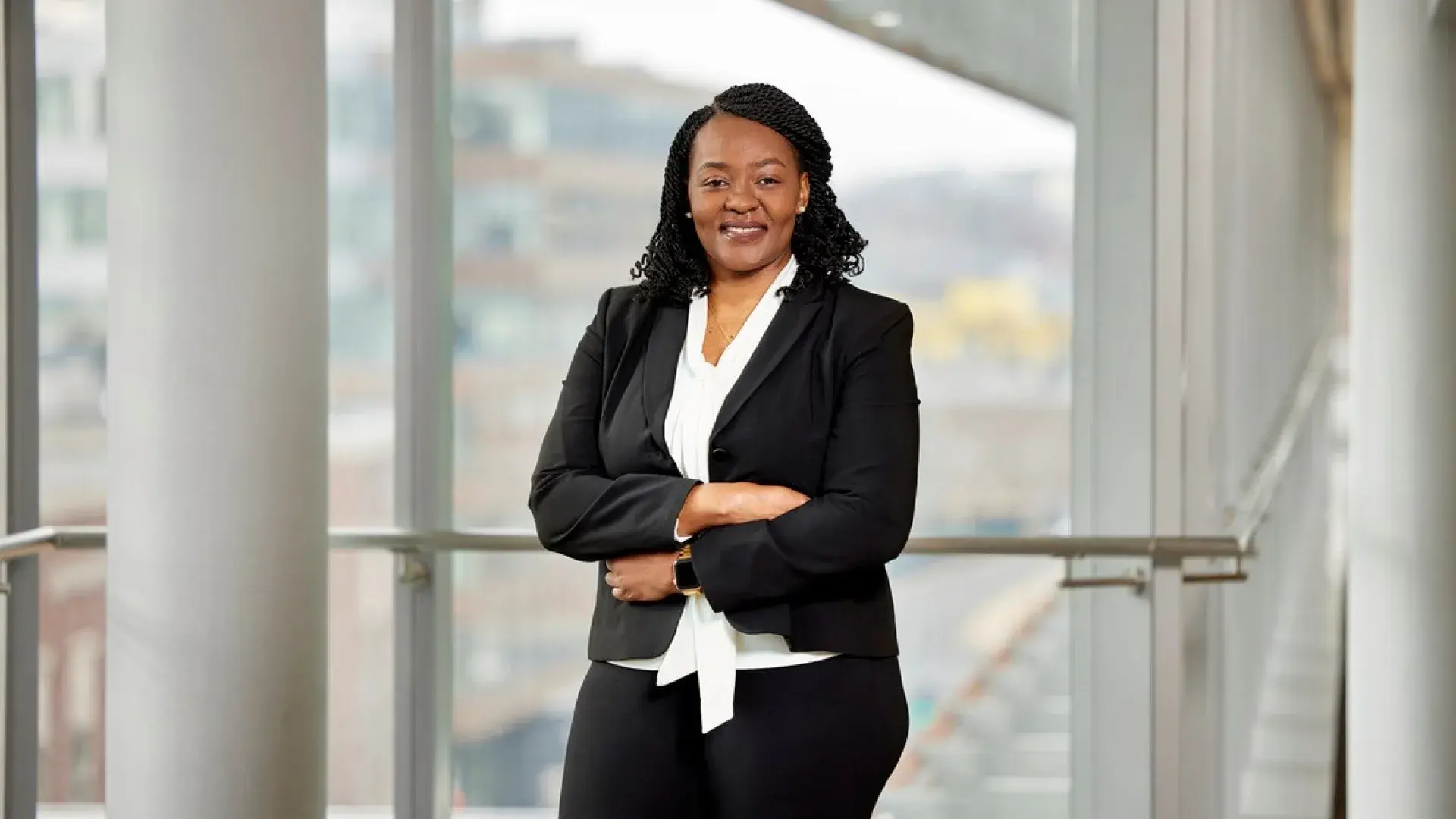
Personal, educational, and professional experiences help Speech Language Pathologist Juliet Ochura make a difference
After a medication error caused a brain injury in her one-year-old son, Juliet Ochura had to navigate through a multitude of new experiences. She had no way of knowing some of those experiences would lead to a new career.
While her son was at Spaulding Rehabilitation Hospital’s inpatient rehabilitation unit, he received care from physical, occupational, and speech therapists. That’s where Ochura met Lynette Holmes, an MGH Institute faculty member in speech language pathology, who was her son’s speech and feeding therapist.
“Watching Lynette work with my son was how I learned about the profession,” explained Ochura. “I found it really inspiring and it looked like something I would love to do for families who have kids like mine.”
Ochura had an undergraduate degree in linguistics and literature from Kenyatta University, and a Master’s in project planning and management from Maseno University, both in her native Kenya. She had worked with the Centers for Disease Control performing behavioral research on HIV intervention and saw speech language pathology as a way to combine her interests in linguistics and healthcare. She applied to the IHP, completing her Master’s in Speech Language Pathology in 2017. She also earned her Certificate of Clinical Competence in Speech Language Pathology in 2018, and Certified Lactation Counselor certification in 2019.
“I always knew I wanted to do the medical aspect of speech language pathology, that’s why I chose the IHP. The medical concentration allowed me to focus on what I knew what I wanted to do but the affiliation with MGH was also a key factor. While I was there, I had two separate clinical placements at MGH which helped to solidify my drive to work in medical speech language pathology,” she said.
In addition to learning the clinical skills needed to be an SLP, Ochura says that her IHP education taught her non-clinical skills necessary for working in a hospital. She points to the importance of the IMPACT classes that focused on teaching students how to work with interdisciplinary teams. “In the hospital, you’re always going to be working with other disciplines, so it’s helpful to know what they do, how to collaborate, and build those teams.”
Ochura had professors who highlighted the importance of thinking about diverse patient caseloads. “Charles Haynes (who retired last year) always made a point of bringing you back to thinking about things like second language learners, cultural differences, and working with interpreters. That primed me to think about those things and how to better serve those populations.”
Those lessons have been put into practice in her current role as a speech language pathologist at both Boston Medical Center and Boston Children’s Hospital, specializing in evaluating and treating pediatric feeding and swallowing disorders, known as dysphagia. Her work includes diagnosing using videoflouroscopic swallow studies and treatment of conditions that include aspiration, feeding and swallowing difficulties in premature babies, management of dysphagia in the Growth and Nutrition interdisciplinary clinic (with gastroenterology, psychology, dietician, and social work), sensory-based feeding difficulties, and Avoidant/restrictive food intake disorder.
At Boston Medical Center, Ochura has had several experiences that have inspired her do more to address health equity.
“I was treating patients and giving them handouts in English, but they speak Spanish or Haitian Creole,” she noted.
Improving access to health literacy is one way she has been bridging the gap in access to care for underserved communities related to the challenges that arise in implementing dysphagia interventions in the pediatric population. She has also relied on understanding what different families may be going through in addition to their health concerns.
“When we are in a population that is multicultural, children and families really value having a practitioner who can understand not just the science and the medicine, but also the social and cultural things that matter to them. There is a lot of think about in terms of the social and psychological stressors. If people have food insecurity or housing insecurity, their priorities are going to be different than when the only thing they are thinking about is the problem that brought them to you.”
Ochura is conducting research to understand the unique challenges of underserved families who care for children requiring dysphagia interventions. She also recently received Health Equity and Patient Safety grants from Boston Medical Center, which have helped her get dysphagia education videos and other resources to patients in five languages, and distribute feeding supplies such as thickeners, bottles, and nipples, to income constrained families who receive care at BMC. The grant will also provide more education about dysphagia for providers. She has conducted focus groups with caregivers in Spanish, Haitian Creole, and other languages to better understand the barriers to accessing care from the perspective of the caregiver, and strategies for improving them.
“This work is very dear to my heart, and I am proud to be a leader advocating for change in this niche,” said Ochura.
Do you have a story the Office of Strategic Communications should know about? If so, let us know.
